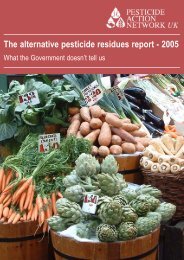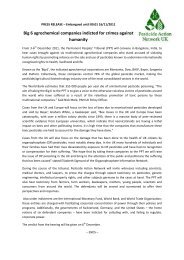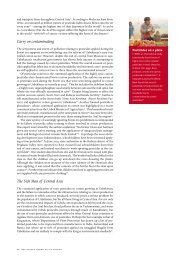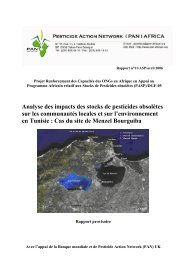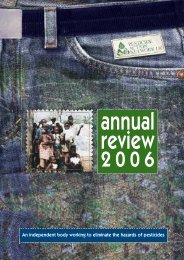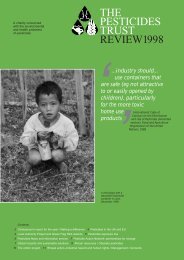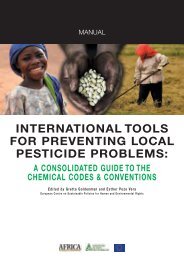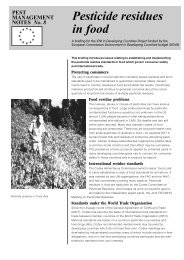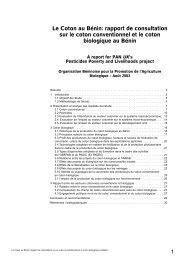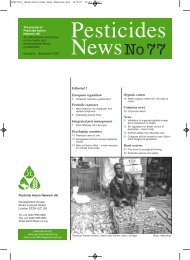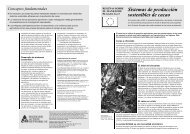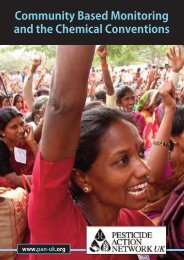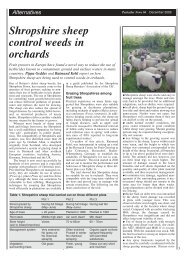Tanzania Multi Stakeholder Map - WebNG
Tanzania Multi Stakeholder Map - WebNG
Tanzania Multi Stakeholder Map - WebNG
Create successful ePaper yourself
Turn your PDF publications into a flip-book with our unique Google optimized e-Paper software.
Activities<br />
1. Building multi-stakeholder involvement<br />
2. Community monitoring of health hazards<br />
3. Eco-toxicological Monitoring - Documenting and<br />
communicating environmental impacts<br />
4. African Stockpiles Programme – Opportunities and actions<br />
5. Development of the Consolidated guide and checklist<br />
for implementation of conventions<br />
6. Conducting Case Studies: to document gaps between<br />
regulation and the field – risk and mitigation<br />
7. Integrated Pest Management - organise field visits for<br />
policy makers to demonstrate the benefits and appropriateness of<br />
sustainable strategies,<br />
8. Communicating results- communication strategy<br />
Activity 1 – <strong>Multi</strong>stakeholder support<br />
<strong>Map</strong>ping exercise: <strong>Stakeholder</strong> identification<br />
Three national stakeholder workshops:<br />
‣initial(August 2005), (project aim, objective, activities,<br />
Review needs of the participants and stakeholders etc)<br />
‣mid-term review workshop (July 2006), (to<br />
share information, review progress and identify constraints - to<br />
evaluate the benefits of activities and provide feedback for action<br />
‣evaluation Workshop (July 2007), (to review<br />
progress and limitations of the project; evaluate activities and<br />
material produced as part of the project; identify activities for<br />
continuation and strategies for collaboration)<br />
Activity 2 – Community monitoring on<br />
health hazards<br />
Training in community monitoring:<br />
‣ Training of Trainers (ToT) workshop will be organised for NGO trainers to share<br />
knowledge on the empowerment of communities in community monitoring.<br />
‣ Trained Individual will identified trainers from other <strong>Tanzania</strong>n NGOs and CSOs to use<br />
the material and help with monitoring.<br />
‣ New materials will be developed as well as adapt existing materials for pilot use<br />
Implementation of community monitoring:<br />
‣ Pilot studies will be initiated with two communities over at least one cropping season in<br />
areas where pesticides are widely used (e.g. Coffee/cotton/vegetable production)<br />
‣ results will be shared in a national workshop of trainers<br />
‣ Dissemination of information to appropriate national bodies,<br />
‣ Designated National Authority for the Rotterdam (PIC) Convention to discuss how to<br />
integrate the methodology with national data gathering strategies, identify priority<br />
pesticides for elimination, encourage strategies for more sustainable alternatives<br />
Disseminating results for international learning<br />
experiences:<br />
‣ results of health monitoring will be presented at meetings of the Conference of the<br />
Parties and other relevant international gatherings concerned with implementing<br />
Chemical Conventions.<br />
‣ use of posters and exhibition material, and where appropriate by bringing community<br />
representatives<br />
Actvity 5 – Consolidated guide and<br />
checklist for implementation<br />
<br />
<br />
<br />
The number and range of international agreements can<br />
be confusing, even for experts, so a consolidated guide<br />
to create a user-friendly, for different conventions is<br />
under preparation by EcoSphere. (a draft guide will be<br />
presented by Gretta Goldenman)<br />
‣ The Consolidated Guideline and Checklist for Implementation will cover at<br />
least: Rotterdam, Stockholm, Basle, Bamako Conventions, ILO<br />
Convention 184 (Chemical Convention), Montreal Protocol, Biosafety<br />
Protocol, FAO and WHO codes, relationship to IFCS-initiated activities<br />
and other appropriate processes.<br />
A strategy for communication and dissemination of the<br />
Convention guide will be developed (NIPs, ASP, National<br />
Chemical Profiles …).<br />
National guides will include briefings for health centres,<br />
agricultural extension agents and NGOs;<br />
54




